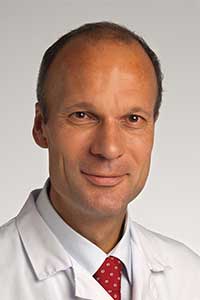
Prof. Darius Moradpour, Switzerland
Prof. Darius Moradpour received his M.D. from the University of Zurich, Switzerland and completed his training in Internal Medicine at the University Hospital in Zurich. After a postdoctoral fellowship at the Massachusetts General Hospital, Harvard Medical School, Boston, MA he joined the University Hospital in Freiburg i. Br., Germany to complete his clinical training in Gastroenterology and Hepatology and to establish a research group focused on the molecular virology and pathogenesis of hepatitis C.
At the University of Freiburg he became Assistant Professor in 1999 and Associate Professor in 2004. In 2002-2003 he was a Visiting Professor at the Center for the Study of Hepatitis C, The Rockefeller University, New York, NY.
Current research interests include the molecular virology and pathogenesis of hepatitis C and E as well as translational and clinical studies in viral hepatitis, hepatocellular carcinoma and other liver diseases. Work in his laboratory is funded by the Swiss National Science Foundation and other sources.
He is the President of the Annual Congresses 2017 and 2018 of the Swiss Society of Gastroenterology and an Associate Editor of the Journal of Hepatology. He has served as President of the Swiss Association for the Study of the Liver, Governing Board Member of the European Association for the Study of the Liver, Associate Editor of Hepatology, Chairman of the Scientific Committee of the Swiss Hepatitis C Cohort Study, and Member of Editorial Board of the Journal of Virology.
He received the Prix Leenaards in 2006, the Prix Cloëtta in 2008, the Prize of Honor of the Swiss Society of Gastroenterology in 2009, the title of Doctor honoris causa of the University of Lyon, France in 2012, and he was elected as Member of the German National Academy of Sciences Leopoldina in 2014.

Prof. Robert Thimme, Germany
Prof. Robert Thimme is the Director of the Department of Medicine II (Gastroenterology, Hepatology, Endocrinology and Infectious Diseases). His research focus lies on the immune responses in hepatitis B virus (HBV) and hepatitis C virus (HCV) infection as well as hepatocellular carcinoma (HCC).
By using novel cell culture models his group could for example show that different effector functions are dominantly required for the inhibition of viral replication in HBV versus HCV infection. In addition, his group could show the relative contribution of different mechanisms of T cell failure, such as viral escape and T cell exhaustion in HBV and HCV infection.
His work is supported by grants from the DFG, BMBF, several foundations and the EU. He has published more than a hundred papers on the tissue of immunobiology of HBV, HCV and HCC and is or has been in the editorial boards of several journals, such as Journal of Clinical Investigation, Gastroenterology, GCT, Journal of Hepatology, Journal of Virology or Journal of Infectous Diseases.

Prof. Fabien Zoulim, France
Prof. Fabien Zoulim obtained his M.D. in Gastroenterology and Hepatology in Lyon Medical School in 1991. He has also obtained a PhD in Molecular and Cellular Biology and was trained as a post-doctoral researcher at Fox Chase Cancer Center in Philadelphia.
He is Professor of Medicine at Lyon I University since 1997. He is currently Medical Director of the Hepatology Department at the Hospices Civils de Lyon, and Scientific Director of the Department of Immunology and Virology of INSERM Unit 1052 where he is leading the team on ‘Antiviral therapy of viral hepatitis’. Dr Zoulim has served as an Associate Editor for Journal of Hepatology and is currently Associate Editor for Gut.
Furthermore, he has been the scientific coordinator of a European community-funded Network of Excellence on the management of antiviral drug resistance, and is currently coordinating the ANRS “HBV cure” program in France. He co-founded the International Coalition to Eliminate HBV (ICE-HBV: http//:www.ice-hbv.org). Fabien Zoulim is a recognized expert in the field of viral hepatitis and antiviral therapy, and has published more than 400 articles (H index 75, Web of Science).
